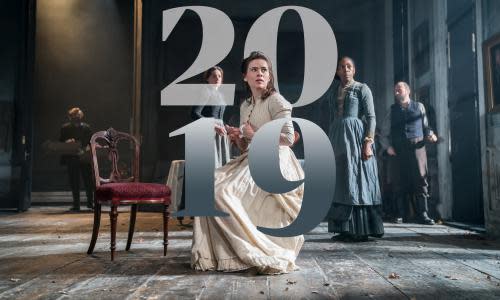Top 10 theatre shows of 2019

10
La Reprise: Histoire(s) du Théâtre (1)
Royal Lyceum, Edinburgh
This was the kind of show you want to see at an international festival: something that experiments with both form and content. Conceived and directed by Milo Rau and presented by NTGent, it was about the theatrical process while also inquiring into a notorious homophobic murder outside Liège in 2012. No definitive explanation of the motive was offered. What was shocking was the realisation that, at the eventual trial, the victim was viewed as the guilty party because he was gay. Read the full review.
9
Mary Poppins
Prince Edward theatre, London
This was no mere reheating of Richard Eyre’s original 2004 production. Instead, it acquired new drive and heart. Zizi Strallen, as the flying nanny, was an intriguing mix of bullying briskness and heavenly solicitude. You’d also have to be a pretty hardened soul not to be astonished by the sight of Charlie Stemp airily tapdancing while suspended upside down from the proscenium arch. Read the full review.
8
Glass. Kill. Bluebeard. Imp.
Royal Court, London
Caryl Churchill, ever experimental, put together four short plays dealing with myths, murder and our need for stories. I found Glass strangely opaque, but I loved the longest piece, Imp, about a couple of non-kissing cousins bound together for life by a long-buried secret. Both Deborah Findlay, given to sudden murderous rages, and Toby Jones, a depressive with a taste for running, were memorable, and the whole evening was a danse macabre tinged with dark comedy. Read the full review.
7
Rutherford and Son
Crucible, Sheffield
Caroline Steinbeis’s revival of this 1912 play by Githa Sowerby outstripped a later one at the National. There was no fancy directorial footwork: simply a rapt attention to a riveting text that shows a Tyneside glassworks owner confronting the fact that his day is done. Owen Teale was excellent as the crumbling patriarch and Laura Elphinstone left one gutted by the scene where she realises that her lover’s ultimate loyalty lies not with her but with her father. Read the full review.
6
Betrayal
Harold Pinter theatre, London
How does one find a new angle on Pinter’s study of the corrosive nature of betrayal? Jamie Lloyd stripped the action to the bone. The focus was on the play’s psychological intricacy and on the performers. Tom Hiddleston, stricken by the revelation of his wife’s affair, Zawe Ashton as the free-spirited Emma and Charlie Cox as the blithely sensual Jerry all left an indelible impression. Read the full review.
5
The Doctor
Almeida, London
Robert Icke took a little-known play by Arthur Schnitzler about Viennese antisemitism, Professor Bernhardi, and turned it into a parable for our times. Juliet Stevenson played, unforgettably, a secular Jew who runs a prestigious clinic and attracts toxic publicity when she prevents a Catholic priest ministering the last rites to a dying girl. Icke’s version, which cast actors irrespective of gender or colour, was about both medical ethics and identity politics, and was the highlight of his Almeida career. Read the full review.
4
Our Lady of Kibeho
Royal and Derngate, Northampton
Religious faith is rarely explored on the modern stage. Katori Hall’s fine play, however, dealt both with the apparent visitation of the Virgin Mary to a trio of Rwandan schoolgirls in 1981 and the political tension between Tutsi and Hutu that led to genocide in 1994. Balancing the miraculous and the material, James Dacre’s production put a whole world on stage and Gabrielle Brooks, Yasmin Mwanza and Pepter Lunkuse showed the divisions among the supposed visionaries. Read the full review.
3
Kunene and the King
Swan, Stratford-upon-Avon
John Kani encompassed a large slice of South African history in his play about a testy encounter between two men. Antony Sher played a cantankerous old actor dreaming of playing King Lear and riddled with racial prejudice. Kani himself played his carer, angry at the inequalities of a post-apartheid society. Both actors were magnificent in a production directed by Janice Honeyman that suggested a love of Shakespeare was the one unifying factor. Read the full review.
2
Small Island
Olivier, London
Helen Edmundson’s adaptation of Andrea Levy’s novel was a big event: an account of how aspiring Jamaicans left one small island in 1948 to arrive in another with great expectations tragically unfulfilled. The play coincided with revelations about Britain’s treatment of the Windrush generation but its strength lay in its portrait of individuals: Leah Harvey and Gershwyn Eustache Jnr caught perfectly the trials of a couple struggling with postwar reality and Rufus Norris’s production combined the intimate and the epic. Read the full review.
1
Rosmersholm
Duke of York’s, London
I’d rate this one of the best Ibsen productions I’ve ever seen, along with Katie Mitchell’s Ghosts, Ingmar Bergman’s The Wild Duck and Peter Hall’s John Gabriel Borkman. Ian Rickson turned a complex, tantalising play into a more political Tristan and Isolde with John Rosmer and Rebecca West seen as heartbroken romantics driven inexorably to suicide by an oppressive past and an imperfect present. It helped that there was palpable erotic tension between Tom Burke as a Rosmer floundering through loss of faith and Hayley Atwell as a radical Rebecca imprisoned by her memories. But everything about this production felt right. Duncan Macmillan’s adaptation was sharp without being intrusive, Rae Smith’s design reminded us of the ever-present mill wheel, Neil Austin’s lighting showed the gloom-shrouded Rosmer mansion being fitfully illumined. There was a host of strong supporting performances from Giles Terera, Jake Fairbrother, Peter Wight and Lucy Briers. You were constantly aware of servants longing for the freedom that Rosmer and Rebecca earnestly talk about. A dark, difficult play was given abundant life. Read the full review.

